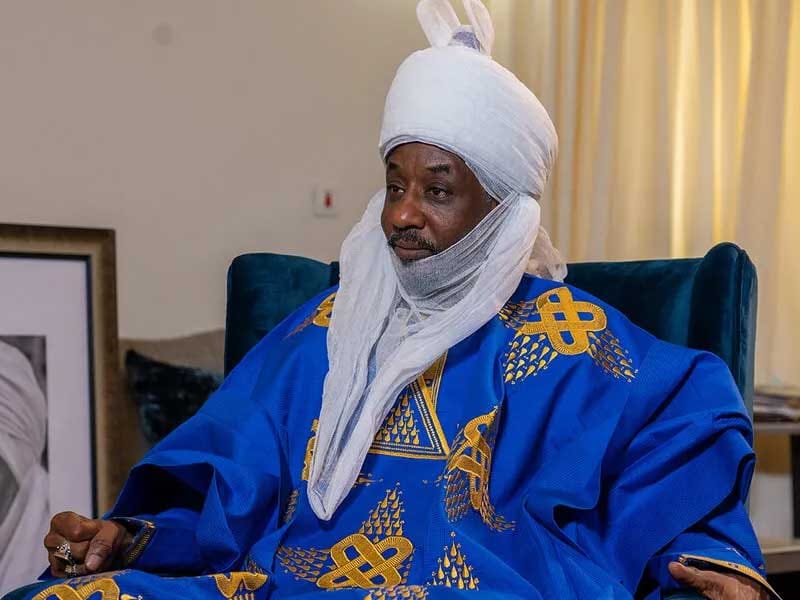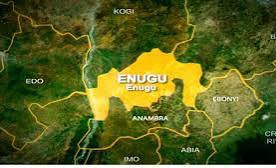Emir Sanusi Warns Kano Youths Against Plans to Attack Igbos Over Edo Killings
The 16th Emir of Kano, Muhammadu Sanusi II, has taken a bold stance in addressing the unrest that has followed the tragic killings of 16 Hausa travelers in Uromi, Edo State, cautioning the youths of Kano against engaging in acts of violence or reprisal against non-indigenous communities. Speaking on Sunday after leading the Eid-el-Fitr prayers at the Kofar Mata Eid ground in Kano, Sanusi emphasized the importance of peace, justice, and unity in the face of such provocative incidents.
The tragic incident that led to this situation involved the killing of 16 Kano-bound Hausa travelers by suspected criminals in Uromi, Edo State, sparking widespread outrage and calls for vengeance. The act of violence was seen as a brutal and unprovoked assault on innocent lives, particularly in a context where ethnic and regional tensions already exist in various parts of Nigeria. In response to this tragedy, several youths in Kano, as well as other areas of northern Nigeria, began planning reprisal attacks, particularly targeting the Igbo community, which has a significant presence in Kano and other parts of the northern region.
YOU MAY READ
The Conspiracy Against the President of the Senate, Distinguished Senator Godswill Akpabio (GCON) and the South: Northern Politicians and the 2027 Power Struggle
In his address, Emir Sanusi expressed deep concern over the growing tension and the plans to attack innocent individuals in Kano. He was quick to point out that while the killing of the travelers was a senseless and grievous act, the youth must not take matters into their own hands and attack innocent members of the non-indigenous community in Kano. Sanusi’s words were firm and clear: “We got information yesterday (Saturday evening) that youths in some areas are planning to launch reprisal attacks on non-indigenes after the Eid prayers. We are instructing them not to carry out such attacks.”
By advising against such attacks, Sanusi not only cautioned against the cycle of violence but also emphasized the need for peaceful solutions. The Emir’s intervention was crucial in preventing further escalation, as the tension in the state was beginning to spill over into violence that could potentially lead to the destruction of lives, properties, and peace in the region.
One of the most important aspects of Sanusi’s appeal was his call for traditional leaders to play a more active role in ensuring peace and order within their communities. Traditional leaders in many parts of Nigeria, especially in the northern region, hold significant influence over local populations. They are seen as custodians of cultural and social norms and are often the first point of contact in times of crisis.
Sanusi urged these leaders to be vigilant and proactive in preventing the spread of violence and maintaining a sense of unity among the people. “We call on all traditional leaders to be vigilant,” he said, underscoring that the responsibility for maintaining peace within communities lies not just with the authorities but also with community leaders who understand the intricacies of their people’s needs and concerns. By engaging with the youths and the general population, traditional leaders can serve as mediators, defusing tensions and promoting unity in moments of crisis.
YOU MAY READ
Should Power Return To The North In 2027?
Alongside his call for restraint, Sanusi also made it clear that justice must be pursued for the victims of the Uromi killings. While he emphasized the importance of peace and unity, he also called for the relevant authorities to take swift and decisive action in bringing those responsible for the killings to justice. This appeal for justice was significant, as it spoke to the need for accountability in the face of such brutal acts.
“We appeal to the relevant authorities to ensure justice for the victims,” Sanusi said. “They should investigate and prosecute persons behind the barbaric act.” His call for justice was an appeal not only for the victims’ families but also for the larger society, where a failure to address such crimes could lead to a sense of impunity and further violence. In Sanusi’s view, justice was not just a moral necessity but also a practical one, as it would help to restore a sense of order and fairness in society.
Sanusi’s warning against reprisal attacks also highlighted the dangers of lawlessness and the breakdown of social order. “They should avoid a breakdown of law and order,” he urged. This statement reflected the grave consequences that could arise if the situation spiraled out of control. The act of taking the law into one’s own hands often leads to further violence, loss of innocent lives, and a deepening of ethnic and regional divisions.
In a society where the rule of law is weak, violence and reprisal attacks can quickly become an entrenched part of the culture, leading to cycles of violence that are difficult to break. Sanusi’s message was therefore not only a call for restraint but also a reminder of the importance of upholding the rule of law and ensuring that justice is sought through proper legal channels rather than through vigilantism.
In his Eid-el-Fitr address, Sanusi also drew upon the spiritual significance of the occasion to urge the Muslim faithful to reflect on the lessons learned during the month of Ramadan. Ramadan, a time of fasting, prayer, and reflection, is a period in which Muslims are encouraged to demonstrate self-restraint, empathy, and understanding toward others.
Sanusi reminded the people that the essence of Ramadan lies in fostering peace, tolerance, and goodwill toward others. “We appeal to them [the youth] not to take laws into their hands,” Sanusi reiterated, urging the faithful to carry the lessons of Ramadan forward into their daily lives and interactions with others. The Emir emphasized that the values of compassion, patience, and self-control, which are central to Ramadan, should be maintained beyond the fasting period. He urged Muslims not to return to sins or wrongdoings after the conclusion of Ramadan, stressing that the lessons of the holy month should shape their actions and behavior throughout the year.
This message was important because it connected the spiritual teachings of Islam to the practical realities of peace-building. By urging the youth to embrace the values of Ramadan in times of conflict, Sanusi was calling for a deeper commitment to peace that transcended religious and ethnic divides. The Eid celebration, in Sanusi’s view, was not just a time for feasting and rejoicing, but also an opportunity to reaffirm one’s commitment to justice, unity, and the common good of all Nigerians, regardless of their ethnic background.
YOU MAY READ
Beyond the immediate context of the Uromi killings and the potential for reprisal attacks, Sanusi’s message was one of unity. His appeal to the people of Kano to avoid violence and reprisal was also an appeal for national cohesion in a country that has long struggled with ethnic, religious, and regional tensions. Nigeria’s diversity, while a source of strength, has often been a point of friction, with various ethnic groups and religious communities clashing over perceived injustices and inequalities.
Sanusi’s call for justice, unity, and restraint was a reminder of the need for Nigerians to work together to address their collective challenges. His appeal was not just for peace in Kano or among the Hausa and Igbo communities but for a broader, national sense of togetherness. In a country as diverse as Nigeria, the ability to bridge ethnic and religious divides and work toward common goals is crucial for the country’s long-term stability and prosperity.
Emir Muhammadu Sanusi II’s intervention in the aftermath of the Uromi killings was a critical and timely appeal for peace, justice, and unity. His warning against reprisal attacks and his call for justice were important steps in preventing the situation from escalating further and creating more division and violence. His leadership in this regard demonstrated the vital role of traditional leaders in mediating conflict and guiding their communities through difficult times.
Sanusi’s broader message of unity and his emphasis on the lessons of Ramadan also provided a moral framework for responding to the crisis, urging Nigerians to choose peace over violence and to uphold the values of justice, tolerance, and self-control. In a country fraught with ethnic and regional tensions, such calls for peace are essential for maintaining social harmony and ensuring that justice is served in a fair and orderly manner.
Emir Sanusi Warns Kano Youths Against Plans to Attack Igbos Over Edo Killings | #IgbereTV
The 16th Emir of Kano, Muhammadu Sanusi II, has cautioned youths in the state against attacking innocent members of the non-indigenous community in the state following the killings of 16 Kano bound Hausa travelers in Uromi, Edo State.Sanusi spoke on Sunday, after leading the Eid-el-fitr prayer at the Kofar Mata Eid ground in the state.His words, “We got information yesterday (Saturday evening) that youths in some areas are planning to launch reprisal attacks on non-indigenes after the Eid prayers. We are instructing them not to carry out such attacks.“We appeal to them not to take laws into their hands. They should avoid a breakdown of law and order. We call on all traditional leaders to be vigilant.“Similarly, we appeal to the relevant authorities to ensure justice for the victims. They should investigate and prosecute persons behind the barbaric act,” he said.
Sanusi also called on Muslim faithful to sustain the lessons learned from the Ramadan fasting and not return to sins or wrongdoings..






